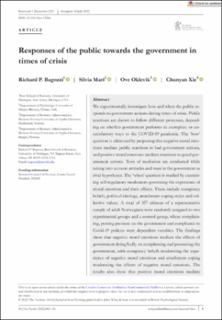| dc.contributor.author | Bagozzi, Richard P | |
| dc.contributor.author | Mari, Silvia | |
| dc.contributor.author | Oklevik, Ove | |
| dc.contributor.author | Xie, Chunyan | |
| dc.date.accessioned | 2022-10-13T09:06:20Z | |
| dc.date.available | 2022-10-13T09:06:20Z | |
| dc.date.created | 2022-08-11T14:37:31Z | |
| dc.date.issued | 2022 | |
| dc.identifier.citation | Bagozzi, R. P., Mari, S., Oklevik, O., & Xie, C. (2022). Responses of the public towards the government in times of crisis. British Journal of Social Psychology. | en_US |
| dc.identifier.issn | 0144-6665 | |
| dc.identifier.uri | https://hdl.handle.net/11250/3025810 | |
| dc.description.abstract | We experimentally investigate how and when the public responds to government actions during times of crisis. Public reactions are shown to follow different processes, depending on whether government performs in exemplary or unsatisfactory ways to the COVID-19 pandemic. The ‘how’ question is addressed by proposing that negative moral emotions mediate public reactions to bad government actions, and positive moral emotions mediate reactions to good government actions. Tests of mediation are conducted while taking into account attitudes and trust in the government as rival hypotheses. The ‘when’ question is studied by examining self-regulatory moderators governing the experience of moral emotions and their effects. These include conspiracy beliefs, political ideology, attachment coping styles and collective values. A total of 357 citizens of a representative sample of adult Norwegians were randomly assigned to two experimental groups and a control group, where complaining, putting pressure on the government and compliance to Covid-19 policies were dependent variables. The findings show that negative moral emotions mediate the effects of government doing badly on complaining and pressuring the government, with conspiracy beliefs moderating the experience of negative moral emotions and attachment coping moderating the effects of negative moral emotions. The results also show that positive moral emotions mediate the effects of government doing well on compliance with COVID-19 regulations, with political ideology moderating the experience of positive moral emotions and collective values moderating the effects of positive moral emotions. | en_US |
| dc.language.iso | eng | en_US |
| dc.publisher | Wiley | en_US |
| dc.rights | Attribution-NonCommercial-NoDerivatives 4.0 Internasjonal | * |
| dc.rights.uri | http://creativecommons.org/licenses/by-nc-nd/4.0/deed.no | * |
| dc.title | Responses of the public towards the government in times of crisis | en_US |
| dc.type | Peer reviewed | en_US |
| dc.type | Journal article | en_US |
| dc.description.version | publishedVersion | en_US |
| dc.rights.holder | © 2022 The Authors. | en_US |
| dc.source.pagenumber | 1-34 | en_US |
| dc.source.journal | British Journal of Social Psychology | en_US |
| dc.identifier.doi | 10.1111/bjso.12566 | |
| dc.identifier.cristin | 2042478 | |
| dc.relation.project | Norges forskningsråd: 312683 | en_US |
| cristin.ispublished | true | |
| cristin.fulltext | original | |
| cristin.qualitycode | 1 | |

